Biden's Paper Straw Policy Reversed by Trump: What It Means for Plastic Waste Efforts

Trump's Executive Order Rolls Back Federal Plastic Straw Ban Sparks Concern Over Environmental Impact
President Donald Trump signed a February 10 executive order that reversed federal policies designed to phase out single-use plastics such as straws from U.S. government operations. Under the new policy, it is expected that the federal government will reverse all its tendencies promoting paper alternatives by embracing plastic straws and containers in the food service and general operations. In this respect, the move comes in conflict with the goal that the Biden administration had of removing plastic waste that was supposed to be completed in 2027.
Trump's executive order unravels some of the plastic straw reduction initiatives established by the Biden administration over complaints that paper straws don't work and do not last long. "Paper straws don't work," Trump said, referencing how most users end up wrestling with the dissolving straw that melts too fast.
This new policy is a giant step away from the federal government's growing efforts to reduce plastic use, especially in food service and event operations. It began as an intent to soon end the dispensing of the federal food service use of the plastic straws along with many other single-used plastics by the year 2027 and even across all government operations by the year 2035. Efforts were going towards reducing serious plastic waste that keeps on negatively impacting oceans and wildlife and so on.
One of the most serious environmental issues for several U.S. states and cities has been single-use plastics; several states have already started enacting bans in these cities for their implementation of the bans in their territories. Many restaurants, as well as bars and diners, stopped giving customers free plastic straws with drinks for the reduction in single-use plastic. Yet plastic straws form just a minuscule aspect of a huge plastic waste issue.
In fact, the U.S. alone produces a massive amount of single-use plastic waste. According to the World Economic Forum, one garbage truck of plastic is being dumped into the ocean every minute, which may double by 2030 and increase fourfold by 2050 if this trend continues. This directly affects marine ecosystems since plastics break into microplastics that harm the wildlife and find their way up the food chain, even up to humans. Recent studies, published in such scientific journals as Microplastics in Fish and Fishery Products and Risks for Human Health, have confirmed traces of microplastics found in fish, birds, and even human blood and tissues.
This growing issue is further worsened by the single-use plastics, including straws, not only because of the pollution to the environment but also due to the huge problem of break-down of plastics in the oceans leading to microplastics in the food web. These plastics decompose over hundreds of years, and during that process, they fragment into tiny particles, thus harming the wildlife consuming them even more.
Moreover, the generation of plastic is an environmental concern. Over 90% of the plastic products are fossil fuel-based products and are scarce resources that have a potential emission during the manufacture of greenhouse gases. The more plastic waste grows, so does its environmental footprint and contributes to global warming as well as pollution.
While this policy reversal of Trump may seem a good omen to the plastic industry, it seems to precipitate a worrying long-term environmental implication of reversing progress. As it stands, most multinationals and businesses have moved away from using plastic straws and have vowed never to return to them and have made the consumption of plastic central to their sustainability agenda. In stark contrast, Trump's executive order has been viewed by many as a bad omen in the fight to reduce global plastic waste.
More than 390 million plastic straws are estimated to be used daily in the U.S., the majority lasting less than 30 minutes before contributing to pollution and harming wildlife. These include single-use plastics, which significantly contribute to overall pollution and wildlife damage. For example, they are a serious threat to marine animals such as turtles, where these wrong assume the plastic material is food. The microplastics is formed due to the degradation that occurs in the environment, whereby plastic straws and other such items break into smaller pieces and find their way into the natural ecosystems and oceans.
Organizations such as Straws Turtle Island Restoration Network argue that plastic debris, especially single-use plastics, poses serious environmental risks to marine animals. Plastic straws are reported to break down after more than 200 years and have an immense risk of endangering the wildlife, especially sea turtles, since they can become entangled by or eat plastic wastes.
Conclusion:Despite the protests from environmental groups and activists, the reversal of the federal ban on plastic straws is part of a much larger debate about the balance between the interests of industries and the need for stronger environmental protections. The move is expected to give a boost to the plastic industry, which has long faced pressure to find alternatives to plastic products. But critics have declared it a step backward in the fight to reduce plastic waste and save the environment as a whole.In the next few years, it will be the problem of coming up with solutions that would balance the interests of economic and environmental responsibility so the battle against plastic pollution continues even through a change in policy. His original approach in the Biden administration was cited as a first step toward more sustainable practices in government operations, and many environmental groups are still urging stronger action to address the global plastic crisis.
Source: Associated Press, New York Post, World Economic Forum
What's Your Reaction?

















